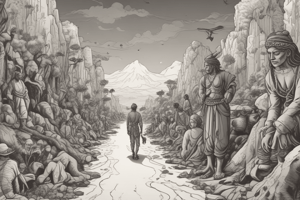Podcast
Questions and Answers
According to British anthropologist Edward B. Tylor, culture is defined as:
According to British anthropologist Edward B. Tylor, culture is defined as:
- A complex whole including knowledge, belief, art, morals, law, custom, and other acquired capabilities and habits (correct)
- The common way of life shared by a group of people
- The complex whole that consists of everything we think and do
- A cumulative creation of man
How did B. Malinowski define culture?
How did B. Malinowski define culture?
- As the cumulative creation of man (correct)
- As a complex whole including knowledge and beliefs
- As the common way of life shared by a group of people
- As the system of learned behavior shared by a group
Robert Bierstedt views culture as:
Robert Bierstedt views culture as:
- The complex whole consisting of everything we think and do (correct)
- The moral, intellectual, and spiritual discipline for advancement
- The collective heritage learned by individuals and passed through generations
- The common way of life shared by a group of people
Culture serves as a medium through which man achieves his ends, according to:
Culture serves as a medium through which man achieves his ends, according to:
What does culture encompass beyond nature and biology?
What does culture encompass beyond nature and biology?
How is culture transmitted among the members of a group?
How is culture transmitted among the members of a group?
Edward B. Tylor defined culture as 'a simple whole which includes knowledge, belief, art, morals, law, custom, and any other capabilities and habits acquired by man as a member of society'.
Edward B. Tylor defined culture as 'a simple whole which includes knowledge, belief, art, morals, law, custom, and any other capabilities and habits acquired by man as a member of society'.
Culture is solely defined by anthropologists and not sociologists.
Culture is solely defined by anthropologists and not sociologists.
B. Malinowski regarded culture as the product of nature rather than the creation of man.
B. Malinowski regarded culture as the product of nature rather than the creation of man.
Robert Bierstedt views culture as only consisting of material possessions.
Robert Bierstedt views culture as only consisting of material possessions.
Culture encompasses only biological aspects and excludes moral and intellectual disciplines.
Culture encompasses only biological aspects and excludes moral and intellectual disciplines.
Culture is not transmitted among the members of a group.
Culture is not transmitted among the members of a group.
Culture is a system of unlearned behavior.
Culture is a system of unlearned behavior.
Culture is not a collective heritage passed from one generation to another.
Culture is not a collective heritage passed from one generation to another.
'Culture' has consistent meanings across different disciplines.
'Culture' has consistent meanings across different disciplines.
Flashcards are hidden until you start studying




